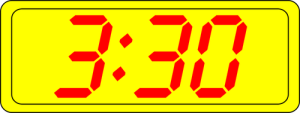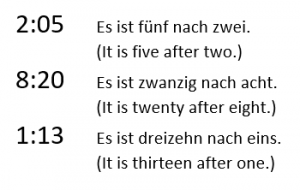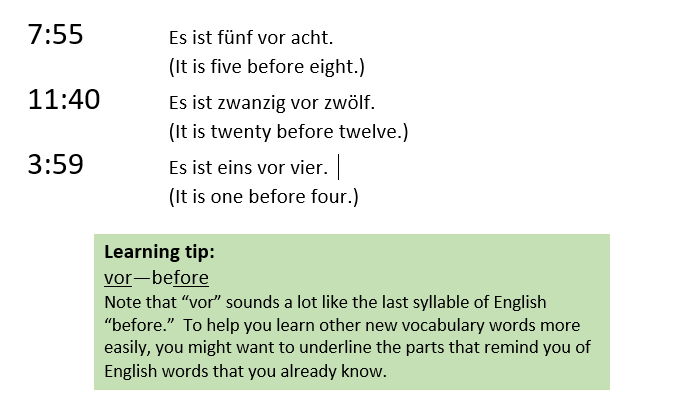16 Section 2-1
Kapitel 2
In Chapter 1, you learned numbers up through the thousands. In this chapter, you will use them to tell time.
Ex. A: Video. Nicos Weg. Click the link to watch episode 9, “Zahlen von 1 bis 100” to review numbers. Do the exercises after the video.
https://learngerman.dw.com/en/zahlen-von-1-bis-100/l-37265621.
Ex. B: Video. Nicos Weg. Click the link to watch episode 10, „Wichtige Nummern.“ You will review how to say your age from Chapter 1. You will also learn how to ask for someone’s telephone number.
https://learngerman.dw.com/en/wichtige-nummern/l-37269501.
2.1: Telling Time (unofficial/conversational)
Telling time in German uses basic numbers that you already know. It will be used to answer the following questions.
- Wie viel Uhr ist es? (What time is it?/“How much clock is it?”)
- Wie spät ist es? (How late is it?)
- Wie viel Uhr haben wir? (What time do we have?)
Start with the expression “Es ist,” then list the number.
Time on the exact hour:

Es ist drei Uhr. (It is three o’clock.) [Audio clips courtesy of Wikimedia user Jeuwre, Creative Commons Attribution-Share Alike 4.0 International.)
Shorter form: Es ist drei. (It is three.)

Es ist ein Uhr. (It is one o’clock.)
Shorter form: Es ist eins. (It is one.)


Time on the half-hour:
To tell the time on the half-hour, German rounds up to the next hour.


Es ist halb acht.
Longer form: Es ist halb acht Uhr.
 Es ist halb vier. (Audio courtesy of Wikimedia user Jeuwre, Creative Commons Attribution-Share Alike 4.0 International.)
Es ist halb vier. (Audio courtesy of Wikimedia user Jeuwre, Creative Commons Attribution-Share Alike 4.0 International.)
Longer form: Es ist halb vier Uhr.


Time after the hour:
To say that it is just past the hour, use the word nach, “after,” to say how much after the hour it is.

3:05 Es ist fünf nach drei. (Audio courtesy of Wikimedia user Jeuwre, Creative Commons Attribution-Share Alike 4.0 International.)
Time before the hour:
To say that it is just before the next hour, use the word vor, „before,“ to say how much before the next hour it is.

3:40 Es ist zwanzig vor vier. (Audio courtesy of Wikimedia user Jeuwre, Creative Commons Attribution-Share Alike 4.0 International.)
Telling time on the quarter hour:
Just like English, German has a word that means “fifteen minutes” before or after the hour. Viertel—quarter (hour). Note that Viertel is capitalized because it is a noun; all German nouns are capitalized.
A: Wie viel Uhr ist es? (What time is it?)
B: Es ist Viertel nach neun. (It is a quarter after nine.)
A: Wie spät ist es? (How late is it?)
B: Es ist Viertel vor vier. (It is a quarter before/to four.)
(Audio courtesy of Wikimedia user Jeuwre, Creative Commons Attribution-Share Alike 4.0 International.)

Video. Click to see me reteaching how to tell time in German.
To say that something happens AT a certain time, use the preposition um.
A: Wann hast du Deutsch?
B: Ich habe Deutsch um elf Uhr.
Ex. H: Partnerarbeit. Julias Stundenplan.Take turns with your partner to ask each other when Julia has the following classes. Don’t forget to use the preposition um to say at what time she has these classes.
Beispiel:
A: Wann hat Julia Englisch?
B: Sie hat Englisch um halb neun.
|
English |
8:30 |
|
Philosophie |
12:20 |
|
Deutsch |
9:45 |
Sport |
1:30 |
|
|
Musik |
10:10 |
Mathe |
1:55 |
|
|
eine Pause |
11:00 |
Chemie |
2:40 |
|
EXTRA PRACTICE: Go to Germanzone.org’s website for more practice with telling time.
- https://www.germanzone.org/time-telling-time-2-colloquial/.
- https://www.germanzone.org/telling-time-1-colloquial-time/.
Click the link to go to a matching game that will review all of the time expressions you have learned.

